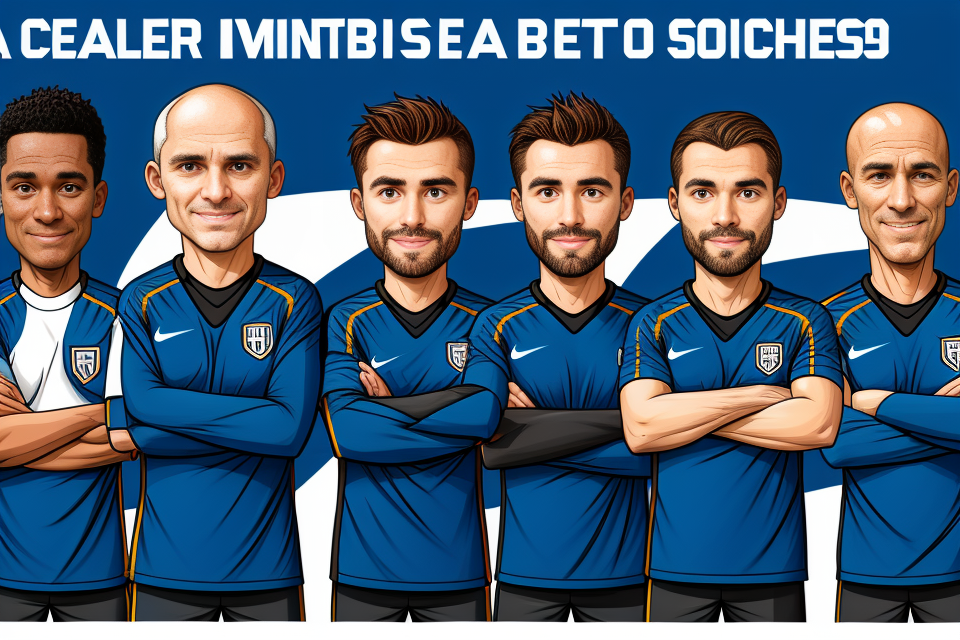Soccer, also known as football, is one of the most popular sports in the world. Many people dream of becoming a soccer coach, leading their team to victory and guiding young players to reach their full potential. But can you become a soccer coach without playing soccer? This is a question that has been debated among soccer enthusiasts for years. In this comprehensive guide, we will explore the answer to this question and examine the skills and qualities necessary to become a successful soccer coach, regardless of whether you have played the sport or not. Whether you are a seasoned player or a complete novice, this guide will provide you with the information you need to pursue your dream of becoming a soccer coach.
The Importance of Playing Soccer for Becoming a Coach
Benefits of Playing Soccer
- Improved Physical Fitness
Playing soccer can significantly improve one’s physical fitness. The sport requires a high level of endurance, strength, and agility, all of which can be developed through regular training and participation. As a coach, having a strong physical foundation can help you better understand the demands of the game and develop effective training programs for your players. - Enhanced Understanding of the Game
Playing soccer provides a unique perspective and understanding of the game that cannot be gained from simply watching or reading about it. By participating in matches and training sessions, a player gains an intimate knowledge of the tactics, strategies, and techniques used on the field. This experience can be invaluable for a coach, as it allows them to better communicate with their players and make informed decisions during matches. - Development of Leadership Skills
Playing soccer also provides opportunities for the development of leadership skills. Whether it’s taking charge of a team or motivating teammates, players learn how to effectively communicate and lead others. These skills can be transferable to a coaching role, where a coach must motivate and guide their players to achieve their goals. Additionally, having experience in a leadership role on the field can help a coach understand the dynamics of team dynamics and how to effectively manage conflict and build team cohesion.
The Role of Playing Soccer in Becoming a Successful Coach
- Firsthand experience of the game
Having played soccer at any level provides a coach with a unique perspective on the game. As a player, one gains an understanding of the game from the perspective of a participant, which is crucial in coaching. Firsthand experience allows a coach to know what it feels like to be on the field, to understand the game’s physical and mental demands, and to know what players go through during a match.
- Opportunity to learn from coaches and teammates
Playing soccer at any level also provides an opportunity to learn from coaches and teammates. Coaches can learn from their own coaches and teammates by observing their playing style, tactics, and techniques. Playing soccer also allows a coach to learn from other coaches, including those from opposing teams. Learning from others can help a coach develop new ideas and approaches to the game, which can be valuable in coaching.
- Credibility as a former player
Having played soccer at any level can also provide a coach with credibility as a former player. Playing soccer gives a coach a unique perspective on the game, and that experience can help build trust with players. Credibility as a former player can also help a coach establish rapport with players, which is crucial in coaching. Players are more likely to listen to and respect a coach who has played the game at a high level.
Overall, playing soccer can provide a coach with a unique perspective on the game, an opportunity to learn from others, and credibility as a former player. These experiences can be invaluable in becoming a successful coach.
Alternatives to Playing Soccer for Aspiring Coaches
While playing soccer is undoubtedly an important aspect of becoming a successful coach, it is not the only way to gain the necessary knowledge and experience. For those who have not had the opportunity to play soccer at a competitive level, there are several alternatives that can help aspiring coaches develop the skills and expertise needed to lead a team.
- Participating in other sports or activities: Coaching soccer requires a diverse set of skills, including leadership, communication, and strategic thinking. Participating in other sports or activities can help aspiring coaches develop these skills and gain valuable experience working with teams. For example, playing basketball or participating in a school play may help a coach learn how to motivate and lead a team, as well as how to work effectively with others.
- Volunteering as a team manager or assistant coach: Even if you have never played soccer at a high level, you can still gain valuable experience by volunteering as a team manager or assistant coach. This can provide an opportunity to learn about the game from a different perspective and gain hands-on experience working with players and parents. It can also help you develop important skills such as organization, communication, and time management.
- Attending coaching clinics and workshops: There are many coaching clinics and workshops available that can provide aspiring coaches with the knowledge and skills needed to coach soccer. These events can cover a wide range of topics, from the basics of coaching to advanced tactics and strategies. Attending these events can help you learn from experienced coaches and gain a deeper understanding of the game. It can also provide an opportunity to network with other coaches and learn about new coaching techniques and methods.
The Skills and Qualities Needed to Become a Soccer Coach
Technical Knowledge
- Understanding of soccer tactics and strategies
- The ability to analyze the game and identify patterns of play
- Knowledge of different formations and their strengths and weaknesses
- Understanding of the role of each position on the field
- Familiarity with rules and regulations
- Knowledge of the Laws of the Game as outlined by FIFA
- Understanding of the different age groups and their specific rules
- Familiarity with the equipment and facilities needed for soccer matches and practices
- Knowledge of injury prevention and first aid
- Understanding of proper warm-up and cool-down techniques
- Knowledge of how to recognize and respond to common soccer injuries
- Familiarity with basic first aid procedures such as treating sprains, strains, and concussions.
Interpersonal Skills
- Ability to communicate effectively with players, parents, and officials
- The ability to convey information clearly and concisely is essential for a soccer coach. This includes not only on-field communication with players during training and matches, but also off-field communication with parents and officials. Effective communication can help to build trust and understanding among all parties involved.
- Empathy and understanding of players’ needs and concerns
- As a soccer coach, it is important to be able to understand and empathize with the needs and concerns of your players. This includes recognizing and addressing any physical or emotional challenges they may be facing, as well as being aware of any personal or family issues that may be affecting their performance on the field. By demonstrating empathy and understanding, you can build a strong and supportive team environment.
- Conflict resolution and mediation skills
- In any team setting, conflicts and disagreements are inevitable. As a soccer coach, it is important to have strong conflict resolution and mediation skills in order to effectively address and resolve these issues. This may involve facilitating discussions between players, helping players to see different perspectives, and finding mutually agreeable solutions. Strong conflict resolution skills can help to maintain a positive team dynamic and prevent conflicts from escalating.
Other Relevant Qualities
In addition to the technical knowledge and experience, there are several other relevant qualities that are crucial for becoming a successful soccer coach. These qualities include:
- Passion for the game: A passion for soccer is essential for any coach, regardless of their playing experience. A coach who is passionate about the game will be more likely to inspire and motivate their players to achieve their best. They will also have a deeper understanding of the game and be able to convey their enthusiasm to their players.
- Patience and persistence: Coaching soccer requires patience and persistence, especially when working with young players who are still developing their skills. A coach must be willing to take the time to teach and explain concepts, and be patient with players who may struggle to understand or execute them. Persistence is also important, as coaching is a long-term commitment that requires a coach to stick with their players through thick and thin.
- Adaptability and flexibility: A coach must be adaptable and flexible in their approach to coaching. Different players have different learning styles, and a coach must be able to adjust their coaching style to meet the needs of each player. Additionally, a coach must be able to adapt to changing circumstances, such as injuries or weather conditions, and be flexible in their approach to game strategy and tactics.
How to Become a Soccer Coach Without Playing Soccer
Obtaining Education and Certification
To become a soccer coach without playing soccer, one must focus on obtaining the necessary education and certification. Here are some steps to take:
- Enroll in soccer coaching courses or programs: There are many soccer coaching courses and programs available that cater to individuals who have not played soccer at a competitive level. These courses are designed to teach the fundamentals of soccer and coaching techniques to individuals who are new to the sport. Some popular soccer coaching courses include the United States Soccer Federation (USSF) coaching courses, the National Soccer Coaches Association of America (NSCAA) courses, and the English Football Association (FA) coaching courses.
- Obtain coaching licenses or certifications: Once you have completed a soccer coaching course, you can apply for a coaching license or certification from a recognized soccer governing body. The USSF, for example, offers a variety of coaching licenses, including the D, C, B, and A licenses. To obtain these licenses, you must pass written and practical exams that test your knowledge of soccer rules, tactics, and coaching techniques.
- Complete continuing education and professional development: To maintain your coaching license or certification, you must complete continuing education and professional development requirements. This may include attending coaching workshops, seminars, and conferences, as well as completing online courses and exams. These requirements ensure that you stay up-to-date with the latest coaching techniques and trends in the sport.
Overall, obtaining education and certification is a crucial step in becoming a soccer coach without playing soccer. By enrolling in soccer coaching courses, obtaining coaching licenses or certifications, and completing continuing education and professional development requirements, you can demonstrate your knowledge and commitment to the sport and establish yourself as a qualified soccer coach.
Gaining Experience
One of the most effective ways to become a soccer coach without playing soccer at a high level is by gaining experience. There are several ways to do this, including volunteering as a coach or assistant coach, seeking out internships or apprenticeships with experienced coaches, and building a network of contacts and mentors in the soccer community.
Volunteering as a coach or assistant coach is a great way to gain experience and learn from experienced coaches. Many youth soccer organizations and clubs rely on volunteer coaches to help run their programs, so there are often opportunities available. By volunteering, you can gain valuable experience working with players of all ages and skill levels, as well as learn about different coaching philosophies and techniques.
Seeking out internships or apprenticeships with experienced coaches is another effective way to gain experience. Many colleges and universities offer coaching internships or apprenticeships as part of their sports science or kinesiology programs. These programs allow you to work with experienced coaches and learn about different aspects of coaching, such as player development, game strategy, and team management.
Building a network of contacts and mentors in the soccer community is also important for gaining experience. By attending coaching clinics, workshops, and conferences, you can meet other coaches and learn about different coaching techniques and philosophies. You can also reach out to experienced coaches in your area and ask if they would be willing to mentor you or provide guidance as you pursue your coaching career.
Overall, gaining experience is an essential part of becoming a successful soccer coach, even if you have never played at a high level. By volunteering, seeking out internships or apprenticeships, and building a network of contacts and mentors, you can learn from experienced coaches and gain the skills and knowledge needed to succeed in the sport.
Developing a Specialty or Niche
Developing a specialty or niche as a soccer coach can be a great way to set yourself apart from other coaches and attract a specific group of players to train. By focusing on a particular age group or skill level, or specializing in a particular aspect of the game, such as goalkeeping or defense, you can establish yourself as an expert in your field. Additionally, developing expertise in working with athletes with disabilities or special needs can also be a valuable niche to pursue.
Focusing on a particular age group or skill level
One way to develop a specialty as a soccer coach is to focus on a particular age group or skill level. For example, you may choose to specialize in coaching young children, teenagers, or adults. By focusing on a specific age group, you can tailor your coaching style and training programs to meet the unique needs and challenges of that age group. This can help you build a reputation as a coach who specializes in working with a particular age group, which can attract players looking for specialized training.
Specializing in a particular aspect of the game
Another way to develop a specialty as a soccer coach is to specialize in a particular aspect of the game. For example, you may choose to specialize in coaching goalkeepers, defenders, or midfielders. By focusing on a particular position, you can develop expertise in the specific skills and techniques required for that position. This can help you attract players looking for specialized training in that area, and can also help you stand out from other coaches who do not specialize in a particular position.
Developing expertise in working with athletes with disabilities or special needs
Finally, developing expertise in working with athletes with disabilities or special needs can be a valuable niche to pursue as a soccer coach. By specializing in this area, you can help athletes with disabilities or special needs develop the skills and confidence they need to succeed on the soccer field. This can involve working with athletes with physical disabilities, cognitive disabilities, or other special needs, and may require specialized training and knowledge in this area. By developing expertise in working with athletes with disabilities or special needs, you can make a positive impact on the lives of these athletes and help them achieve their goals on the soccer field.
Overcoming Challenges and Building a Successful Coaching Career
Addressing the Lack of Playing Experience
- Transferable skills and knowledge from other sports or activities
- Many skills and knowledge areas from other sports or activities can be applied to soccer coaching. For example, experience in team management, leadership, communication, and tactical analysis from other sports can be beneficial in coaching soccer.
- It is important to identify these transferable skills and highlight them in your coaching philosophy and resume.
- Dedication and passion for the game
- Despite not having playing experience, a passion for the game is essential for becoming a successful soccer coach. Demonstrating enthusiasm and knowledge of the game can help you connect with players and build a strong team culture.
- To showcase your dedication, it is important to continuously educate yourself about the game through attending coaching clinics, reading books and articles, and watching games at various levels.
- Coaching qualifications and certifications
- Obtaining coaching qualifications and certifications can help to address the lack of playing experience. Many governing bodies and organizations offer coaching courses and certifications that provide comprehensive training in coaching methodologies, tactics, and player development.
- These qualifications and certifications can help establish your credibility as a coach and demonstrate your commitment to ongoing learning and development.
In conclusion, addressing the lack of playing experience requires highlighting transferable skills and knowledge, demonstrating dedication and passion for the game, and obtaining coaching qualifications and certifications. By doing so, it is possible to become a successful soccer coach without playing soccer at a high level.
Dealing with Criticism and Setbacks
Criticism and setbacks are inevitable in any coaching career, and it’s crucial to learn how to handle them effectively. Here are some strategies to help you navigate these challenges:
- Cultivating a growth mindset and embracing challenges: A growth mindset is essential for overcoming obstacles and developing as a coach. Embrace challenges as opportunities for growth, and be willing to learn from your mistakes. Remember that every setback is a chance to improve and become a better coach.
- Seeking feedback and constructive criticism from players, parents, and peers: Solicit feedback from players, parents, and fellow coaches to gain insight into your strengths and weaknesses. Constructive criticism can help you identify areas for improvement and make necessary adjustments to your coaching style. Be open to receiving feedback and use it as a tool for personal and professional development.
- Staying resilient and persevering through tough times: Resilience is a critical trait for any coach, as setbacks and disappointments are inevitable. When faced with adversity, remind yourself of your goals and the reasons why you became a coach. Focus on the positives and use setbacks as opportunities to learn and grow. Stay committed to your vision and keep pushing forward, even when things get tough.
By embracing challenges, seeking feedback, and staying resilient, you can develop the skills and mindset needed to overcome criticism and setbacks in your coaching career. Remember, success as a coach is not solely determined by wins and losses, but by your ability to learn, grow, and adapt along the way.
Continuously Learning and Improving
Continuously learning and improving is an essential aspect of becoming a successful soccer coach, even if you haven’t played the game at a high level. By staying up-to-date with changes in the game and coaching best practices, attending conferences and workshops, and networking with other coaches and seeking out mentorship opportunities, you can build a strong foundation for your coaching career.
One way to continuously learn and improve as a soccer coach is to stay up-to-date with changes in the game and coaching best practices. This means keeping up with the latest tactics, techniques, and training methods, as well as being aware of any rule changes or updates to the laws of the game. You can do this by reading coaching publications and websites, attending coaching clinics and workshops, and talking to other coaches.
Another important aspect of continuously learning and improving as a soccer coach is attending conferences and workshops. These events provide opportunities to learn from experts in the field, network with other coaches, and gain new insights and ideas that can help you improve your coaching skills. Some conferences and workshops may focus on specific aspects of coaching, such as youth development or strength and conditioning, while others may cover a broad range of topics.
Networking with other coaches and seeking out mentorship opportunities is also crucial for continuously learning and improving as a soccer coach. By connecting with other coaches, you can gain valuable insights and perspectives on the game, as well as learn about different coaching philosophies and methods. Seeking out mentorship opportunities can also be helpful, as you can learn from experienced coaches who can provide guidance and support as you build your coaching career.
Overall, continuously learning and improving is a critical aspect of becoming a successful soccer coach, even if you haven’t played the game at a high level. By staying up-to-date with changes in the game and coaching best practices, attending conferences and workshops, and networking with other coaches and seeking out mentorship opportunities, you can build a strong foundation for your coaching career and help your players achieve their full potential on the field.
FAQs
1. Can you become a soccer coach without playing soccer?
Yes, it is possible to become a soccer coach without playing soccer at a high level. While having playing experience can be beneficial, it is not a requirement to become a successful coach. Many successful coaches have found ways to make up for their lack of playing experience through other means, such as studying the game, seeking out mentorship, and gaining coaching qualifications.
2. What are the benefits of becoming a soccer coach?
Becoming a soccer coach can be a rewarding career choice for those who are passionate about the game. It allows you to share your knowledge and experience with others, and to help players improve their skills and achieve their goals. Coaching can also provide opportunities to travel, network with other coaches and professionals, and gain a sense of satisfaction from seeing your players succeed.
3. What qualifications do I need to become a soccer coach?
The qualifications required to become a soccer coach can vary depending on the level at which you want to coach. At the amateur level, you may not need any formal qualifications, but at the professional level, you will likely need to obtain coaching certifications and licenses. Some of the most popular coaching certifications include the UEFA Pro License, the FIFA Coaching Certificate, and the National Association of Coaches Certification.
4. How can I gain experience as a soccer coach?
Gaining experience as a soccer coach can be done in a variety of ways. One option is to start by coaching at the youth level, where you can work with players of all ages and abilities. Another option is to volunteer your services to a local team or club, or to offer your services to coach a friend’s or family member’s team. You can also seek out opportunities to assist more experienced coaches, or to attend coaching clinics and workshops to improve your skills.
5. What skills do I need to be a successful soccer coach?
To be a successful soccer coach, you need to have a range of skills and qualities. These include leadership, communication, organizational skills, and the ability to motivate and inspire players. You should also have a good understanding of the game, including tactics, strategies, and the rules and regulations. Additionally, you should be able to work well with players of all ages and abilities, and to be able to adapt your coaching style to meet the needs of your players.



